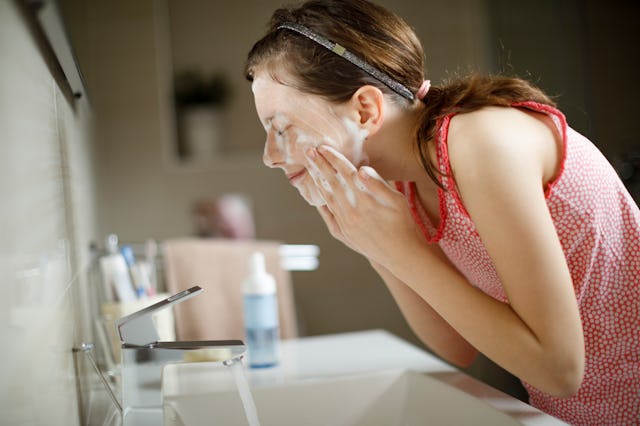When Does My Kid Need To Start A Skincare Routine? Here’s A Dermatologist’s Advice
Some skincare should start as early as age 5, says Dr. Geeta Yadav.

If you're like me, there's a good chance your first foray into skincare involved nearly burning your face off thanks to a three-step system you bought because you saw your favorite celeb shilling for it. Thankfully, things these days are far less bleak (and painful!) now that so much more is known about how to gently care for skin through all of life's different stages.
Still, you might be wondering when to introduce your kid to skincare — after all, it's not like you want to be spending big bucks so your second grader can enjoy a luxe moisturizing routine, right? Fear not, because you can easily teach your little ones how to take care of their skin without the trials and tribulations you went through.
Keep reading for tips from a dermatologist to help you sort it all out and make skincare fun, whether you've got a teenager or a threenager.
When should you introduce your kid to skincare?
Teaching your kiddo about the importance of caring for one's skin should start, first and foremost, with sunscreen, says Dr. Geeta Yadav, board-certified dermatologist and founder of FACET Dermatology. "A lot of kids have a low tolerance for sunscreen application because they only wear it at the beach or on vacation — and in many cases, that step is the one thing standing between them and some fun activities," she says. "Teaching kids that applying sunscreen is a critical healthy habit, like brushing one's teeth, will go a long way towards the health of their skin. It's also a great foundation for understanding the importance of a skincare routine overall."
As a general guideline, Yadav says that "kids around five or so can understand that if their face is dirty, it should be cleaned. They can also understand that if their lips are chapped or if their knees are dry, lip balm and moisturizer can help. Kids understand a lot more than we give them credit for."
What type of skincare should you prioritize during puberty?
Sticking to the basics will likely keep most skin issues at bay until they approach puberty, when hormones might trigger all kinds of changes to your kid's skin — including the many types of acne that caused so many of us to burn our faces in the pursuit of Seventeen Magazine-esque clear skin. "The major change between childhood and adolescence is the surge of hormones," says Yadav. "Those hormones change the quality and output of the sebum, the oils of our skin, which can wreak havoc on the complexion."
This is about the time when you'll want to monitor your child's skin and help them adapt their skincare routine accordingly, says Yadav, who notes that "not all children struggle with their complexions during puberty, and they may not need to make any significant updates to their regimen as they get older."
With any concerns — especially if your kid's breakouts are persistent, or if you notice signs of allergic reactions or sensitivities such as rashes or eczema — a visit to the dermatologist can help your tween or teen find a gentle and safe regimen that works for them. But generally speaking, Yadav says, "Using a gentle witch hazel toner, or even a mild salicylic acid-based cleanser like those from Neutrogena, are great places to start if your child is experiencing excess oil production and pore congestion."
For teens who are beyond the hormonal rollercoaster that is puberty, Yadav notes, "Face and body cleansers with salicylic acid, spot treatments with benzoyl peroxide, and oil-free moisturizers can be very helpful for maintaining clear skin. It's a myth that oily skin doesn't need moisturizer — in many cases, incorporating a lightweight moisturizer can help balance oil production."
What are the absolute basics to work on with your kid?
Overall, helping your kid establish healthy skin habits is easier to start when they're young, says Yadav. "The older we get, the harder it can be to stick to regimens that are good for us, whether that's a nutritious diet or a skincare routine." And while concerns about acne are valid and understandable, Yadav stresses the importance of skin hygiene and protection from head to toe. "Beyond protecting their skin with waterproof and sweat-resistant sunscreen when they're active outdoors, kids need to understand the importance of showering after intense activity to keep their skin clean and fresh, using lukewarm water so as not to strip the skin of its natural oils," she says.
"In a pinch, a body cleansing wipe can be very helpful if they can't rinse off right away," she adds. "I also recommend using Dove body wash, which will help maintain skin's moisture barrier and keep skin nourished while thoroughly washing away dirt and impurities."
As with any and all skin concerns, Yadav doubles back that working with a derm is your best bet. "I'd highly recommend working with a dermatologist, who can help tailor a skincare regimen for your child's unique needs."
This article was originally published on